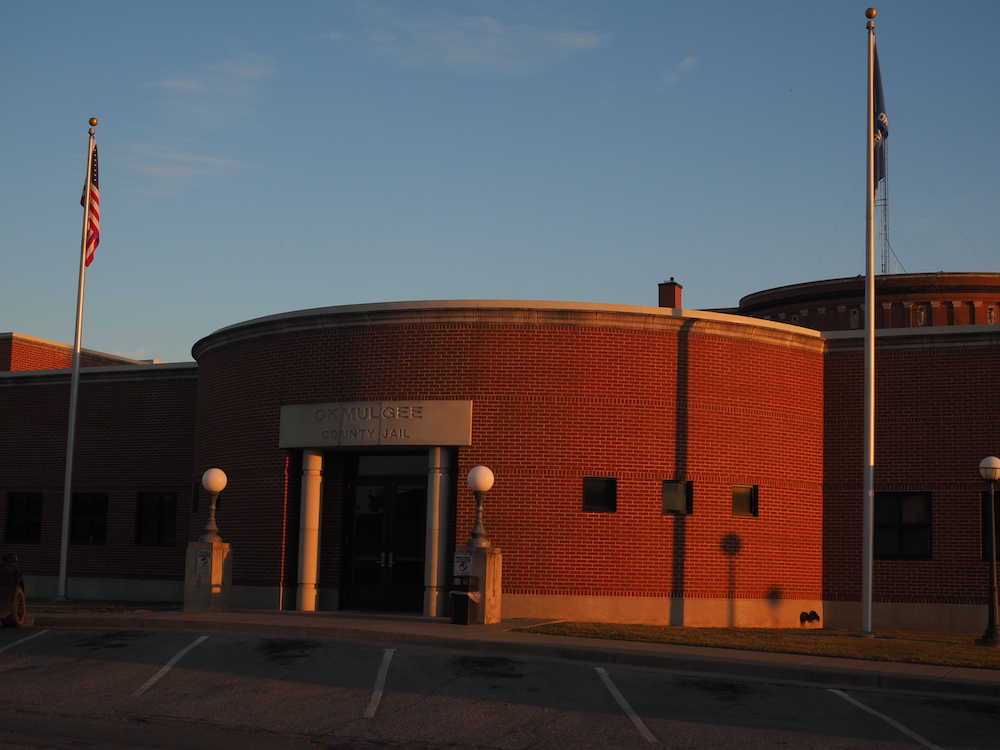
State officials claim the Okmulgee County Jail is violating state and federal law by holding juvenile prisoners without proper certification and housing them alongside adults.
The jail has held youth facing charges in tribal and federal court in the past and claims state officials have no authority over those prisoners.
State inspectors found in 2022 that some of the juveniles were not kept separate from adults. In one case, a juvenile was housed with an adult prisoner, according to an inspection report.
The Oklahoma State Department of Health and the Office of Juvenile Affairs filed separate civil actions in Okmulgee County earlier this month against the trust that runs the Okmulgee County Jail, asking a judge to order the facility to stop housing juveniles until it receives state certification.
The judge denied the Office of Juvenile Affairs’ motion last week. Eric Stall, an attorney representing the jail, said the State Department of Health’s request for an emergency order to stop the jail from holding juveniles was also denied because the judge ruled there was no “emergency.”
“If you believe their allegation about juveniles being housed with adults, that allegation first came to light in July 2022,” Stall told The Frontier. “That was almost 18 months ago.”
The state has notified the court of its intent to appeal.
“We are disappointed in the judge’s ruling,” said Department of Health spokeswoman Erica Rankin. “The agency is exploring all available options.”
After a federal law change in 2021, all Oklahoma jails lost their certifications to hold juveniles in October, 2021, and the Department of Health notified the jails of the changes in August of that year. Okmulgee County jail officials said they believe the restriction only applies to prisoners who are in state custody, and not those being held at the jail for tribes and federal authorities.
Jails that house juveniles are governed by strict state and federal rules, said Ben Brown, general counsel for the Office of Juvenile Affairs. Youths must be separated from the sight and sound of adult prisoners and are not allowed to be placed in solitary confinement for long periods. Jails are also required to provide time for educational activities, Brown said.
Juveniles who are housed in adult prisons and jails report being more afraid for their safety and can be at greater risk for physical and sexual assault, some research shows.
Okmulgee County Jail officials maintain that the facility follows all federal and tribal requirements for holding juvenile prisoners and has a full-time school teacher for youth.
The state moved to take legal action after jail staff blocked inspectors in November from reviewing records and speaking with juveniles being held at the facility for the Cherokee Nation and U.S. Marshals Service. Julie Hubbard, a spokesperson for Cherokee Nation, told The Frontier last week that Cherokee juveniles were not currently being held in the Okmulgee jail. She did not respond when asked if juveniles would return to the jail in the future.
The Okmulgee County Criminal Justice Authority, which operates the jail, claims it did not bar state inspectors from the jail. Jail officials claim they only told inspectors they could not bring cell phones inside or inspect records for and visit prisoners in tribal or federal custody.
Tim Lawson, director of operations at the Okmulgee County Criminal Justice Authority, told The Frontier the state tried to overstep its bounds. The jail doesn’t house any juveniles in state custody, he said.
“It was a losing battle for them from the start, in that they had no legal standing as it related to federal juveniles or sovereign tribal juveniles,” he said.
The Okmulgee County Criminal Justice Authority has repeatedly argued with state officials over access to federal and tribal prisoners and has been cited for violating Oklahoma jail standards, records show.
State health inspectors dinged the Okmulgee County Jail in 2022 for failing to conduct routine checks on prisoners, unsanitary conditions and fire hazards. An inspection also found that the jail was holding six juveniles for tribal and federal authorities, although the facility was not certified by the state to house minors. A jail administrator also refused to provide information to a Health Department inspector about federal prisoners being housed at the facility, the report states.
Jail officials denied State Health Department inspectors access to federal inmates again during an inspection in August, according to inspection reports.
Lawson said during the August inspection that health department inspectors demanded access to juveniles held at the jail, which put the jail in an awkward situation with the tribal and federal authorities it has contracts with to house prisoners.
“They are, for lack of a better term, bullies,”Lawson said. “We will let them talk to them in passing — ‘Hey, how are you being taken care of and fed?’ But we can’t give them an opportunity to get into a case. We’re just protecting them. There’s nobody there on their behalf other than us. We don’t hide anyone from the inspectors when they come through, we give them access, but it’s minimal in that we can’t jeopardize the relationship with those that are paying us to house them.”
Lawson said the jail plans to continue holding juveniles for the tribal and federal authorities.



